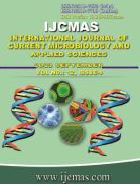


 National Academy of Agricultural Sciences (NAAS)
National Academy of Agricultural Sciences (NAAS)

|
PRINT ISSN : 2319-7692
Online ISSN : 2319-7706 Issues : 12 per year Publisher : Excellent Publishers Email : editorijcmas@gmail.com / submit@ijcmas.com Editor-in-chief: Dr.M.Prakash Index Copernicus ICV 2018: 95.39 NAAS RATING 2020: 5.38 |
In vitro pollen storage study was conducted using pollens of three seeded citrus genotypes viz., ‘Mexican lime’,’ W.Murcott’ and ‘Mosambi’ and five seedless citrus genotypes viz., ‘Lisbon lemon’, ‘Jaffa’, ‘Clementine’, ‘Hamlin’ and ‘Mukaku Kishu’. Pollen viability and germination percentage were evaluated at different storage temperature treatments i.e., at room temperature (in anhydrous calcium chloride) (control), refrigerator 40C, freezer (-200C), freeze drier (-800C). In vitro pollen viability capacity was tested with acetocarmine stain (2%). Among all the tested sucrose concentration (0, 5, 10,15,20,25 %) for in vitro pollen germination 15 % sucrose concentration showed highest pollen germination. Result showed a significant differences in pollen viability and germination under different storage temperature conditions. The pooled data revealed that, among seeded genotype, W. Murcott showed maximum mean viability and germination percentage (67.86 % and 60.88 %, respectively) after 48 weeks of storage at -800C storage temperature and minimum was observed in Mexican lime (46.57 % and 33.71, respectively). Whereas, in low seeded genotype, Mukaku Kishu had maximum mean pollen viability and germination (71.52 % and 64.07 %, respectively) after 48 weeks of storage at -800C storage temperature, and minimum was observed in Jaffa (39.36 % and 28.08 %, respectively). The results indicate that freeze drier storage temperature (-800C) recorded best in terms of retaining pollen viability and germination in both the seeded and low seeded genotypes. However, a progressive declining rate in pollen viability and germination was observed with increase in duration at all the storage temperatures, reaching a minimum at 48 weeks of after storage. However, reduction in pollen storage ability was highest at room temperature and 40C. Pollen grains stored at low temperatures (-800C and -200C) showed good viability and germination percentage over pollen stored at room temperature and 4 0C.
 |
 |
 |
 |
 |